|
|
|
Sort Order |
|
|
|
Items / Page
|
|
|
|
|
|
|
| Srl | Item |
| 1 |
ID:
170061
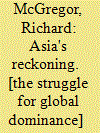

|
|
|
|
|
| Publication |
India, Penguin Books, 2018.
|
| Description |
xv, 396p.pbk
|
| Standard Number |
9780141982854
|
|
|
|
|
|
|
|
|
|
|
|
Copies: C:1/I:0,R:0,Q:0
Circulation
| Accession# | Call# | Current Location | Status | Policy | Location |
| 059793 | 327.5105/MCG 059793 | Main | On Shelf | General | |
|
|
|
|
| 2 |
ID:
106314
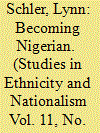

|
|
|
|
|
| Publication |
2011.
|
| Summary/Abstract |
This article examines the process of nationalisation in the lives of African seamen in the era of decolonisation in order to understand why some Africans were drawn to nationalist identities at this time, and what they hoped to gain from this identification. It will be seen that in becoming Nigerian, seamen had to forfeit transnational sources of solidarity, and ultimately had to contend with new forms of exclusion and discrimination based on ethnicity and class within the Nigerian national context. The study thus follows the journey of everyday Africans as they sought out and engaged with ideological and political opportunities on the eve of independence, and the consequences of their aspirations and choices.
|
|
|
|
|
|
|
|
|
|
|
|
|
|
|
|
| 3 |
ID:
128070
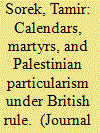

|
|
|
|
|
| Publication |
2014.
|
| Summary/Abstract |
This article explores how political calendars and shared martyrology provided
important markers of identity and symbolic tools for political mobilization in
Mandate Palestine. The dates on the emerging Palestinian calendar grew out of
the politicization and nationalization of traditional holy days, as well as the
commemoration of politically significant events of the period, including those
involving local Palestinian martyrs.
|
|
|
|
|
|
|
|
|
|
|
|
|
|
|
|
| 4 |
ID:
113328


|
|
|
|
|
| Publication |
2012.
|
| Summary/Abstract |
BAE Systems is the UK's largest defence and security firm and one of the world's major arms companies. It has changed from a state-owned aerospace firm to a privatised specialist defence company involved in a range of air, land, sea and cyber systems with a major presence in the US defence market. This article describes and assesses the history of the company, its organization, conduct and performance.
|
|
|
|
|
|
|
|
|
|
|
|
|
|
|
|
| 5 |
ID:
109519
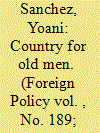

|
|
|
| 6 |
ID:
044246
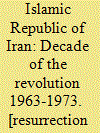

|
|
|
|
|
| Publication |
Iran, Islamic Republic of Iran., 1973.
|
| Description |
198p.pbk
|
|
|
|
|
|
|
|
|
|
|
|
Copies: C:1/I:0,R:0,Q:0
Circulation
| Accession# | Call# | Current Location | Status | Policy | Location |
| 010662 | 955.053/IRA 010662 | Main | On Shelf | General | |
|
|
|
|
| 7 |
ID:
110341


|
|
|
|
|
| Publication |
2011.
|
| Summary/Abstract |
The first encounter between the World Bank and Iran over Iran's oil dispute with Great Britain took place in Washington, DC. The World Bank's Vice President, Robert Garner, met with Iranian Prime Minister Dr. Mohammad Mossadegh, who was in the United States to address a British resolution pending before the United Nations Security Council. In three Bank missions to Iran between January and March 1952, several features of the Bank's proposed temporary management of the recently nationalized Iranian oil company were discussed. The Iranian government refused to approve the employment of British nationals under the Bank's operation of the nationalized oil company. The Bank, meanwhile, prevented by its Articles of Agreement from excluding employment of personnel from one of its members, could not agree to undertake the temporary operation of Iran's nationalized oil company. After a few months' break in contact between Iran and the Bank, the Iranian government sent a representative to the Bank to reopen the discussions - but unaccompanied by a controversial international adviser Mossadegh had requested. Consequently, when the oil talks reopened, the Iranian representative was unprepared to fully articulate a new Iranian proposal that would allow the reengagement of British personnel. Unfortunately, the Bank team did not follow up on this meeting and did not support the Iranian representative in refining the new proposal. Less than a year later, Mossadegh was deposed, and an international consortium took over operation of the Iranian oil company. The fall of Mossadegh demolished the hope for national sovereignty and full democracy in Iran - with far-reaching consequences for the Iranian people and the international community.
|
|
|
|
|
|
|
|
|
|
|
|
|
|
|
|
| 8 |
ID:
119252
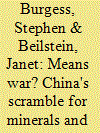

|
|
|
|
|
| Publication |
2013.
|
| Summary/Abstract |
The tendency for rising powers to seek control of resource markets is being repeated in Southern Africa, where rising powers led by China are competing for strategic minerals. This could lead to market failure, shutting out Western companies. However, competition does not mean that armed conflict will occur. The global reach of the United States is such that it can take measures short of war to guarantee the flow of minerals. China will be at a strategic disadvantage for some time in relation to the United States and cannot assert control over the flow of minerals. The Southern Africa case shows that even in the era of globalization, monopolization and nationalization of resources will still be attempted, but those efforts are likely to be countered by global forces in favour of free markets. Rising powers like China may temporarily monopolize resources found on their own territory, but strong global forces will ensure that the flow of most resources continues. Monopolization is unlikely to work outside the territory of rising powers, because they still must rely on sea lanes to transport those minerals. The United States still has the ultimate trump in its navy, which can stop the flow of resources to any would-be monopolist.
|
|
|
|
|
|
|
|
|
|
|
|
|
|
|
|
| 9 |
ID:
106615


|
|
|
|
|
| Publication |
2011.
|
| Summary/Abstract |
This article explores the consequences for the funding of Islamist terrorist groups of nationalization, in the form of state sponsorship, versus privatization, in the form of autonomous financing. The article begins by examining the evolution in terrorist groups' sources of funding from state sponsorship to autonomous activity, then turns to the benefits and costs to terrorist groups of relying on state sponsors. The article then analyzes the benefits and costs of procuring funding autonomously. Finally, the article weighs those benefits and costs in relation to a terrorist group's emphasis on enhancing its constituency versus pursuing its agenda. The article's central conclusion is that nationalization tends to boost a terrorist group's constituency while privatization tends to bolster a group's agenda. Determining which advantage takes priority depends on the relative importance to a given terrorist group at a particular time of enhancing its constituency versus advancing its agenda.
|
|
|
|
|
|
|
|
|
|
|
|
|
|
|
|
| 10 |
ID:
114867
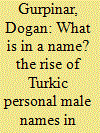

|
|
|
|
|
| Publication |
2012.
|
| Summary/Abstract |
The article overviews the emergence and development of the nomenclature of nationalist Turkish male first names which had to a considerable extent superseded the traditional religiously motivated names and discusses the cultural and political background of this process. Demonstrating its "catastrophical success", the article contributes to the literature on the nationalization of private lives and spheres.
|
|
|
|
|
|
|
|
|
|
|
|
|
|
|
|
| 11 |
ID:
136233
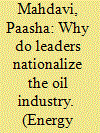

|
|
|
|
|
| Summary/Abstract |
Why do leaders nationalize the oil industry? In line with a general utility-maximizing theory, I argue that leaders nationalize to maximize state revenues while minimizing costs. The latter includes international retaliation and domestic political constraints. Using a novel longitudinal dataset on the establishment of national oil companies (NOCs), the empirical evidence presented in this paper lends support to four primary findings. States are most likely to establish NOCs (1) in periods of high oil prices, when the risks of expropriation are outweighed by the financial benefits; (2) in non-democratic systems, where executive constraints are limited; (3) in “waves”, that is, after other countries have nationalized, reflecting reduced likelihood of international retaliation; and, though with weaker empirical support, (4) in political settings marked by resource nationalism. This last factor is proxied by OPEC membership in large-N analysis and, in a two-case comparison, by the difference in retained profits between the host and foreign governments. The theory and empirics presented here offer some clues for policy makers and multinational companies alike as to when to expect leaders to opt for nationalization.
|
|
|
|
|
|
|
|
|
|
|
|
|
|
|
|
|
|
|
|
|